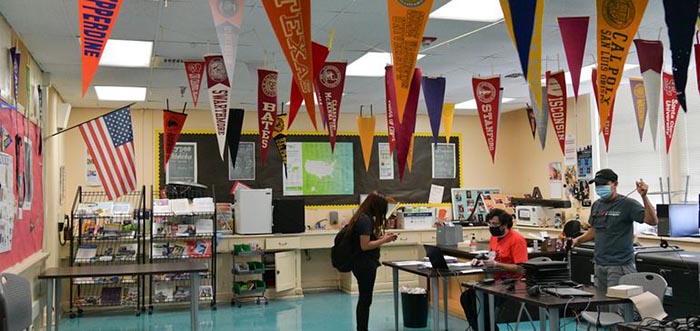
From K-12 Dive
By Anna Merod
May 18, 2022
Dive Brief:
High school students’ interest in the humanities is outpacing other academic fields, according to new research by the American Academy of Arts and Sciences, which analyzed course credits and AP data from the U.S. Department of Education and College Board.
Students took 2,008,352 AP humanities exams in 2020, while 1,034,255 completed behavioral and social science, 788,149 took natural science, 769,366 took math and computer science, and 79,218 took art, AAAS found.
Humanities made up 43% of all AP exams taken in 2020. The number of AP exams completed in the humanities increased 4.6 times from 1996 to 2017 and then evened out between 2017 and 2019. However, the study noted all AP exam participation declined 7-8% from 2019 to 2020, due to challenges related to the pandemic.
Dive Insight:
While the focus on student participation in the humanities — such as foreign languages, history, English and civics — typically takes a higher education perspective, this data shows there’s growing interest in these subjects at the K-12 level, said Robert Townsend, director of humanities, arts and culture programs at AAAS.
In 2018, the humanities saw the smallest share of new bachelor’s degrees — at 10.2% — since 1987, the AAAS study found.
“This is kind of an interesting point of comparison to the way we’ve been looking at, talking about what’s been going on with colleges,” Townsend said.
Even with more initiatives trying to sway students toward STEM courses, Townsend said the new AAAS analysis counteracts any previous fears of the humanities fading in K-12. But it’s worth further study as to why there’s a disconnect in interest in the humanities between K-12 and higher education, Townsend said.
The number of high school students taking social studies courses also grew from 1990 to 2019, due largely to the increase in students participating in world history courses, AAAS said.
This finding is particularly encouraging to Lawrence Paska, executive director of the National Council for the Social Studies. If more students are increasingly showing interest in social studies, Paska said, it’s even more important that they begin to learn about the subject starting in elementary school — and it’s on educators, school boards, parents and community members to provide these early opportunities.
“We have to make sure that we’re not starting their social studies experience in middle school,” Paska said.
Majoring in social studies, like history, can prepare students for a wide range of careers, he said. But when students get to college, they often see a reduction in departments and professors teaching these subjects, Paska said.
“There also is a public message that degrees in these fields don’t bring you a high-paying job,” he said. “We would argue just the opposite.”
Ultimately, a lot of jobs tap into skills that humanities and social sciences teach, he said.
Social studies also create a space for students to learn about identity, culture and communities, Paska said. But as more states adopt bills censoring topics around race, gender and sexuality, he said these state laws contradict state curriculum standards and what social studies education is about.
Paska added if students take fewer classes and AP exams in social studies because of these state laws, it will be an “irreparable disservice to our kids.”
“Not uplifting all voices, not understanding multiple stories in history … that’s going to limit their achievement,” he said.
Photo: Rodin Eckenroth via Getty Images
Read this and other stories at K-12 Dive

